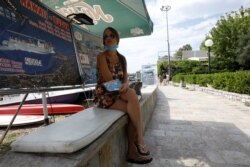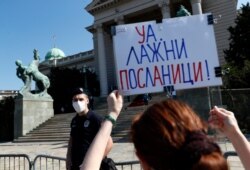The Balkan countries were quick to impose tough restrictions and lockdowns when the coronavirus first appeared on the European continent, prompted by alarm at the impact of the pandemic on their richer Western European neighbors, notably Italy.
Strict curfews were ordered banning people from leaving their homes during weekends and formal holidays. In Serbia, an 80-hour curfew was imposed during the Orthodox Christian Easter. With low infection rates and negligible coronavirus-linked deaths, Balkan leaders were quick to declare that their countries had escaped relatively unscathed and the viral crisis was over for the region.
But it hasn't turned out that way. Eight of the 10 European countries with the current fastest-increasing infection rates now are in the Balkans, leaving their leaders scrambling to contain outbreaks and to relieve pressure on health care systems that are much poorer than their western European neighbors' and can more easily buckle.
Montenegro, which claimed proudly in April to be the first COVID-19-free country in Europe, is among the worst hit by the disease that the coronavirus causes. The resurgence has turned the Balkans into a new viral hot zone, prompting other European Union nations, some also grappling with the alarming return of the virus, to block Balkan citizens from entering their jurisdictions.
The Balkans are currently recording an average of 97 new cases per 10,000 of the population — while the average in the 27 countries of the EU is around 20 cases per 10,000. Regional leaders have taken to berating their citizens for failing to abide by safety restrictions that were left in place after lockdowns started to be lifted in May and June. Serbia's president, Aleksandar Vucic, has variously blamed the spikes on Serbs returning from overseas vacations and other citizens acting irresponsibly.
He also suggested last month that unnamed foreign intelligence agencies had engineered mass protests by "right wing and pro-fascist demonstrators" agitating against the return of curfews. "We will never allow the destabilization of Serbia from within and abroad," he declared.
Critics say the jump in cases across the region has more to do with the early reopening and easing of restrictive measures, compounded by political turmoil and governments in some cases using the lifting of lockdowns for narrowly politically partisan purposes. Lockdowns were lifted in Serbia and North Macedonia, partly in order to conduct elections, the timing of which seemed likely to favor incumbents.
Others suggest that the handling of the virus has eroded citizen trust in governments, which was already in short supply. They say the lockdowns and curfews were too harsh at the beginning, fatiguing populations, and that the off-and-on nature of anti-coronavirus measures has only added to distrust.
"Rigid curfews were not sustainable, in particular as these countries did not experience the alarmingly high death tolls that Spain, Italy, and France experienced," according to Florian Bieber, director of the Center for Southeast European Studies at the University of Graz, Austria.
"Remaining indoors for several days without being able to visualize the risks of not adhering to the rules made it harder to continue such measures in the long term," he wrote in a commentary for the regional news site Balkan Insight. "Polarization and distrust" have played into the pandemic, he adds.
But there are also suspicions that Balkan governments never had the infection as under control as claimed and that the number of cases was being significantly underreported. In Serbia, the head of the country's doctor's union, Gorica Djokic, backed up a recent investigative report suggesting that by early June the country had seen 623 COVID-19-related deaths, as opposed to the official government tally of 244. Only a third of actual cases may have been reported officially.
And more widespread testing may account for the apparent spikes now, say public health experts.
Opposition figures argue the underreporting was a way to encourage voters to turn out for an election the ruling Serbian Progressive Party won in a landslide, an allegation government ministers deny. Serbian lawmaker Marinika Tepic, a member of the opposition Freedom and Justice Party, says, "Literally, on the day of the election, the government stated that the health situation is good and, just a day after, they claim that situation is catastrophic and dangerous."
Serbia's caseload is the highest in the region, at around 29,000 infections, with more than 660 deaths. Bosnia and Herzegovina has registered 15,184 cases so far, Bulgaria has around 14,000, North Macedonia 12,357, and Albania close to 7,000.








